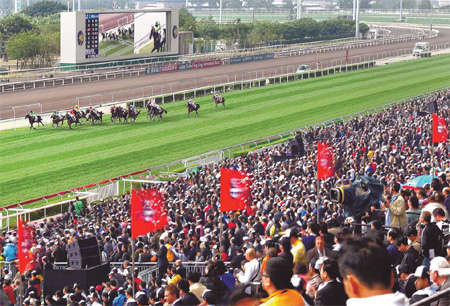Keep racing: Jockey Club better than ever
Updated: 2011-07-03 08:10
By Rebecca Lo (China Daily)
|
|||||||||||
|
The grandstands are packed with race-goers at the 2010 Cathay Pacific Hong Kong International Races. Provided to China Daily |
Numbers don't lie. For the 1984-85 season, the (Royal) Hong Kong Jockey Club's (HKJC) betting turnover was HK$19,685 million ($2,530 million). Twenty-five years later, the turnover for the 2009-10 season was HK$75,497 million.
To say that HKJC has survived in the 14 years following 1997 is a dramatic understatement.
"Horse racing has thrived, even though the club faced a more competitive environment from illegal bookmakers, Macao and other leisure activities in recent years," states Winfried Engelbrecht-Bresges, chief executive officer of HKJC.
"There have been a few ups and downs, of course. Just like everyone else, we had to weather the impacts of the Asian financial crisis, avian flu, SARS and so on. But like all Hong Kong people, we have adopted a 'can do' spirit. We have never given up."
Changes implemented by the HKJC over the past decade include dropping the 'royal' from its name and a corresponding change in its logo, the introduction of soccer betting in 2003, improved quality of racing and better customer service.
"The standard of racing in Hong Kong is the highest ever - world class in fact - and this is largely the result of a conscious decision to encourage the development of international racing in Hong Kong in recent years," says Engelbrecht-Bresges. "Our betting system is the most technologically advanced in the world, processing 6 million transactions per race day."
Most importantly, all the fun and games mean that the local community benefits as well.
Not only is HKJC one of the city's largest employers with a staff of 26,000, it is also Hong Kong's largest taxpayer. In 2010, it contributed HK$13.6 billion to public funds through duties and taxes. It is also the city's largest non-government benefactor with HK$1.52 billion donated to charitable and community projects in 2009-10, a 46 percent increase compared to the 1996-97 season.
"Reunification has given the club the opportunity to contribute to the development of equine sports across China, most notably by building the venues and providing professional supporting services for the equestrian events of the Beijing 2008 Olympics, staged in Hong Kong.
"More recently, we have given similar support to the organizers of the Guangzhou 2010 Asian Games by building the equestrian venues at Conghua. We opened our Beijing Hong Kong Jockey Club Clubhouse in 2008, as more members are visiting Beijing for business or leisure. This marked the club's first physical presence in Beijing and it has proved a very popular venue," says Engelbrecht-Bresges.
"Horse racing is not only an icon of the local way of life; it is also the city's most popular sporting entertainment."
Indeed it is and Hong Kong will be going to the races for many more years to come.
For China Daily
(China Daily 07/03/2011 page3)
